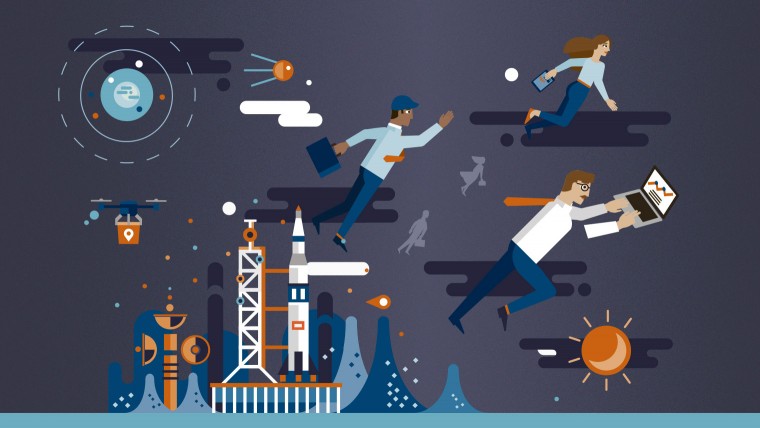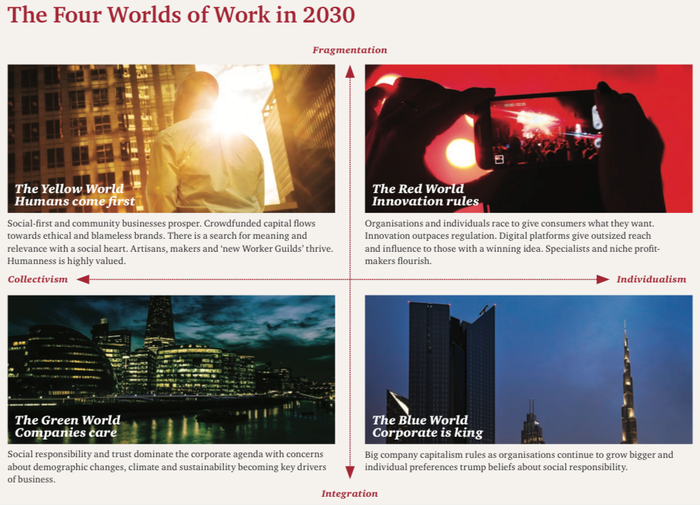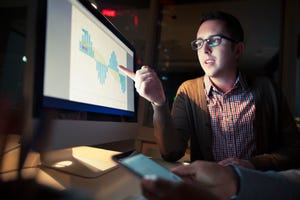To See The Future of Work, Look To Holistic AI
November 17, 2017

The world of work is changing fast. From augmented decisionmaking to automated process engineering, AI is driving efficiencies across businesses today – but these changes speak to much greater shifts in the future. This is highlighted by a PwC study entitled 'Workforce of the future'. Drawing on survey data from over 10,000 businesspeople across the world, the study aims to outline four different directions for the workforce of the future based on a number of key trends emerging out of AI and automation technology.
What the report best highlights is that the future of work could go in any direction. The future is undetermined: we must then "plan for a dynamic rather than static future".
[caption id="attachment_7290" align="aligncenter" width="400"] Dennis Curry, Executive Director and Deputy CTO of Global R&D, at Konica Minolta[/caption]
Dennis Curry, Executive Director and Deputy CTO of Global R&D, at Konica Minolta[/caption]
The workplace is, naturally, the field in which the future of work itself will be decided - where the paradigm shift will be truly formulated. That's the opinion of Dennis Curry, Executive Director and Deputy CTO of Global R&D at Konica Minolta. Formerly the CTO for NATO, Dennis is the principle inventor behind Konica Minolta's Workplace Hub, an enterprise IT solution designed to automate the management of data and IT services. Today, he's working to roll out Cognitive Hub, which is designed to integrate AI at scale across organisations. He explains that the workplace of the future is "a key focus area" for the business technology firm. With the launch of a brand new, dedicated AI website, it's clear that AI is quickly becoming a central facet of Konica Minolta's business.
"In the last decade, workplaces have started to evolve towards digitalisation. In the future, workplaces will be the natural environment in which the evolution of cognitive or intelligent hubs will lead to a paradigm shift in the creation of AI," Curry argues. It's unclear what that paradigm shift will look like right now, but Konica Minolta sees the workplace of the future as "a network of people, sensors, and devices that, when combined, create a digital cortex - a sort of membrane between the physical and digital worlds."
Relying on the availability of data and, more importantly, on the ability to analyse and produce meaningful insight from it, this digital cortex is formulated as the implementation of AI and cognitive solutions within a distributed - yet federated - hybrid cloud-edge infrastructure, similar to the underlying connections between various regions of the brain. "The digital cortex will assist and augment the cognitive capabilities of users through advanced interaction, integration, and contextualisation of resources, providing context-aware artificial intelligence and decision support that leverage both localised information and broader community knowledge whenever needed," explains Curry.
Future of Work Stuck In A 'Cognitive Trap'
Curry believes that the majority of AI systems available today can typically be divided into two categories. There's 'one-on-one' AI which focuses on individuals - such as chatbots and personal assistants - that use Natural Language Understanding (NLU) to provide basic solutions and services for the consumer mass market. On the other hand, there are customised, high-scale AI platforms that have been developed for entire businesses that are primarily designed for working on large datasets to meet large-scale needs. The problem, he argues, is that these solutions are generally use-case focused; they fail to take a long-term approach.
"Both of these types of systems were built predominantly to meet the requirements of cost, security, and stability, which is satisfactory enough. However, their ruling logic has had to suit everybody. Current solutions focus only on AI platforms for specific applications for the short-term, while missing out on the bigger picture in the longer term," he argues.
In adopting this position, the possibility of adapting these systems to meet the needs of individuals is limited. It's something Curry describes as the 'cognitive trap'. While the technology remains caught in this trap, organizations and workplaces will be unable to integrate AI into their broader processes, hindering the full potential of AI technology. "In order to thrive, AI solutions need to break away from this cognitive trap and act as AI integrators, augmenting what will be a growing commoditisation of algorithms," Curry argues. "Taking a more holistic, longer-term view of AI services will enable enterprises to move from simply consuming information, towards managing it by augmented intelligence and improving decisionmaking processes."
[caption id="attachment_9431" align="aligncenter" width="808"] PwC's 'Four Worlds of Work' - from 'Workforce of the future'[/caption]
PwC's 'Four Worlds of Work' - from 'Workforce of the future'[/caption]
Holistic AI: The Key To The Future of Work?
This holistic view of AI could hold the key to the future of work - it might even represent the paradigm shift that industry leaders are perhaps searching for. Konica Minolta hold that, in order to exploit the true potential of AI, the solution emerges in the form of distributed OS applications that occupy a new 'middle ground'. "We think that successful implementation of AI technologies should be built upon AI-based, truly federated systems that will learn from our own intuition and emotional intelligence."
Konica Minolta are already formulating different platforms to begin to explore what these federated AI systems might look like. "This is where we position Cognitive Hub - as a truly federated and new type of operating system orchestrating the physical and digital resources of the workplace of the future, to enable individuals and organisations to make more insightful business decisions," Curry explains. Billed as an integration of AI and edge-based IoT solutions, the Cognitive Hub claims to "close the gap between the way machines and people process information," making it possible to scale AI insights across operations and strategy and 'future-proof' the workplace. This ambitious system, Curry says, will be 'the next milestone' in the firm's journey of transformation towards enabling the workplace of the future. "The research we carry out in our laboratories in Europe, Japan, and the United States is bringing together the various elements and platforms that will form Cognitive Hub. Now, we're looking for early adopters, partners, and leading technology players to join us on this exciting journey."
It's unclear what the workplace of the future looks like right now - but pay close attention. It's being built today.
Dennis will be delivering a keynote speech at next month's AI Summit NYC, entitled 'The Future of AI and Cognitive Platforms'. Visit The AI Summit website for more information.
About the Author(s)
You May Also Like


.jpg?width=700&auto=webp&quality=80&disable=upscale)
.jpg?width=700&auto=webp&quality=80&disable=upscale)
.jpg?width=700&auto=webp&quality=80&disable=upscale)
.jpg?width=300&auto=webp&quality=80&disable=upscale)
.jpg?width=300&auto=webp&quality=80&disable=upscale)

.jpg?width=300&auto=webp&quality=80&disable=upscale)
.jpg?width=300&auto=webp&quality=80&disable=upscale)